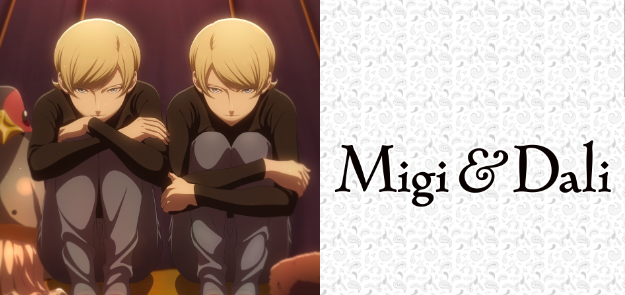English Dub Season Review: Migi & Dali Season One
Overview (Spoilers Below):
After finally adopting a child, the Sonoyamas were unprepared for the mystery that would soon unravel. Hitori seems to be the perfect son for his loving parents. He’s handsome, intelligent, and grateful for his new lavish life—but he has a dark secret. Hitori is actually the twins Migi and Dali (Jackson Kirk) pretending to be one boy, and they have a terrifying motive behind their hidden identity.
Our Take:
Migi & Dali is an anime adaptation of a manga series written by Nami Sano and published by Enterbrain. It was Sano’s final manga before she died of cancer in 2023. It is written and directed by Mankyū, with Mamoru Enomoto serving as assistant director and Geek Toys and CompTown producing the series. Ayumi Nishibata handled the character designs, while Hiroko Sebu composed the music. The opening theme song, “Yūmaga Doki,” is performed by Soraru and Rib, while Nulbarich performs the ending theme song, “Skyline.”
If you need another example of the phrase, “two heads are better than one,” look no further than Migi & Dali, a mystery series involving two identical twins plotting revenge as a singular person. Consisting of thirteen episodes, the first season of Migi & Dali centers on the titular twins, who are similar in appearance but different in personalities. Migi is the gentle and sentimental twin, while Dali is the eldest and is rational and manipulative. Together, they pose as an orphaned boy named Hitori (Solo in the English dub) to get adopted by the Sonoyama parents, Yoko (Katabelle Ansari) and Osamu (Shawn Motes). The parents reside in Origon Village, where Migi and Dali lived with their mother, Metry, as kids before she was killed. While maintaining their identity as the kind Hitori, the twins embark on a revenge quest to find the perpetrator responsible for their mother’s death. However, as they get closer to the truth, the twins discover a much nefarious secret that could put their true identities at risk of exposure.
After watching the first two episodes of Migi & Dali, I suddenly realized that the series is the anime equivalent of Jaume Collet-Serra’s Orphan. The 2009 psychological horror movie also involved a mischievous person pretending to be an orphan while hiding their twisted purpose. The difference is that the twins didn’t suffer from a rare hormonal disorder that stopped their physical growth. However, they do share a twisted and clever personality. Does this similarity affect the series itself? A little bit, but Migi & Dali has enough elements to prevent it from being a copy-and-paste version of Orphan, including its twisty murder mystery.
Regarding its narrative, Migi & Dali is a compelling albeit standard tale of revenge corrupting the twins’ lives, mainly Dali. Dali is the only twin who’s hellbent on finding the person responsible for Metry’s tragic death. However, Migi’s gradual desire to live a new life puts a damper on his plans, resulting in his attempt to get his brother back on track, even if it means disguising himself as a girl. The series offers a serviceable portrayal showcasing the characters finding a better way to achieve peace instead of revenge, even though some of its plot development felt rushed despite being thirteen episodes long. As for its tone, the series is supposed to have a mixture of mystery, horror, and comedy, with the latter being used in small doses. While the mystery horror element delivered some solid, creepy moments, the humor occasionally felt out of place with its dark tone, especially with one of the twins spazzing out while holding in his laughter.
Migi & Dali has a seemingly enjoyable plot to coincide with its delightfully creepy aesthetics. Unfortunately, I hate to say that the quality was heavily affected by its English dub version. I usually don’t mind watching anime in English, but if one lacks the effort and care put into that dub, you immediately lose my attention. There were specific sequences where the English dialogue was mistimed with the mouth movements, and the sound mixing made it challenging to hear some of the lines. The English cast also didn’t make much of a mark with their performances, but Jackson Kirk managed to be the tolerable of the bunch. It seemed challenging for Kirk to voice two identical brothers while keeping them distinct, but the actor managed to pull it off just fine. The worst part of the cast is the actor behind Eiji Ichijo, the top student at the twins’ new school. I couldn’t find the actor’s name who voiced the character, but whoever he is, I hope he spends the next few weeks in acting school before his next gig. I’m not sure if it’s the voice actor himself or the direction given to him, but his English performance as Eiji was devoid of any emotion and even mundanely forced. It’s the type of performance you’d see in a corny soap opera like General Hospital, but not in a fun and parodist way.
I haven’t watched the original Japanese version of Migi & Dali to make a clear comparison, but I can bet that that version might be a much better experience than its effortless English dub. But besides this unfortunate blunder, would I recommend Migi & Dali? From a narrative perspective, sure. It’s a tolerable addition to the mystery anime library that offers enough twists and unsettling moments to keep fans of the genre engaged. I wouldn’t say it’s the best thing to come out of the revenge mystery genre, but I was mostly impressed at how it kept me interested despite its imperfections. Regarding its plot and decent animation by Geek Toys and CompTown, Migi & Dali is a serviceable creepy and mildly diverting case of “double trouble”.


























Do we know if Hulu will be the only entity to have the dub, or if it will be on other platforms, too? The show in general is definitely going to be on multiple platforms.